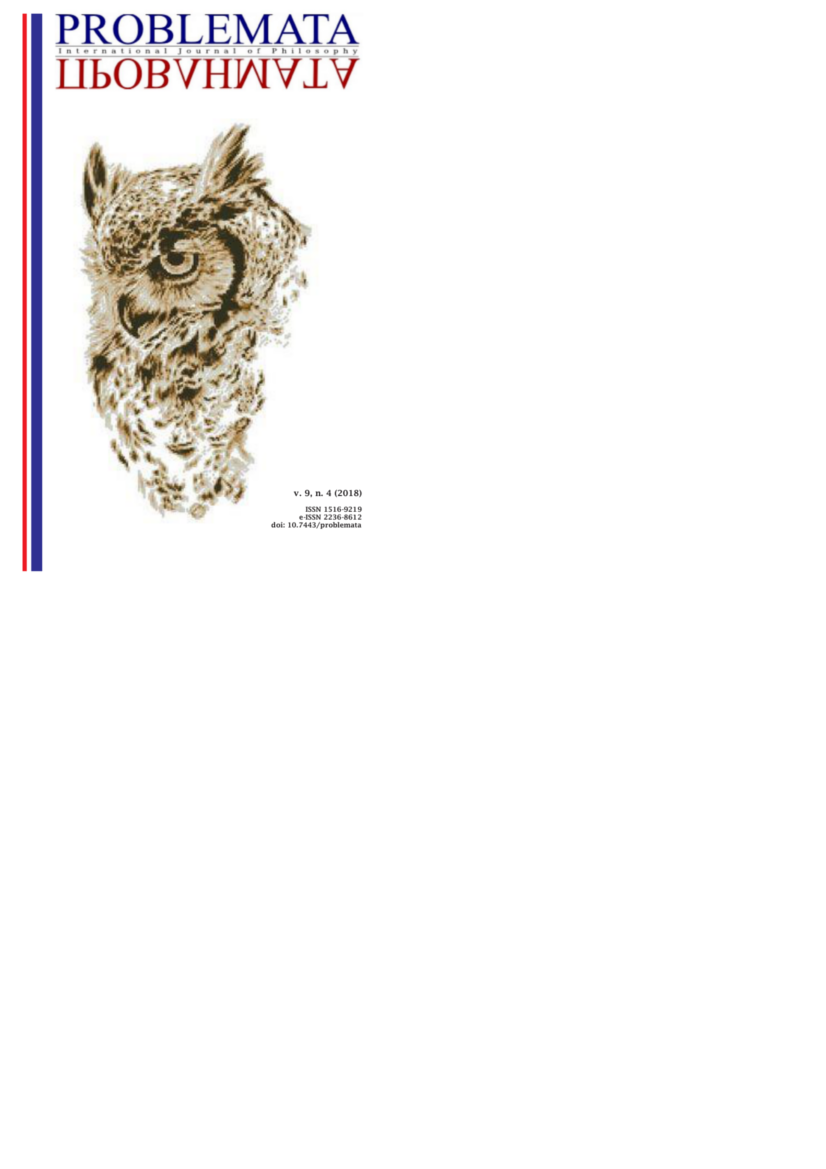ALTERITY IN THE SOPHIST: PLATONIC ECHOES HIDDEN IN THE PROPOSAL RICOEURIANA
DOI:
https://doi.org/10.7443/problemata.v9i4.40747Keywords:
Paul Ricoeur. Plato. Sophist. Identity. Alterity.Abstract
In the Sophist, Plato already develops argumentative principles on the concepts of identity and recognition, sameness and otherness. In drawing limits between what is characterized by Being, non-Being and the possibility of these two greatness relate to each other, Plato explains, by the stranger’svoice, the same and the other, ways of understanding beings. Ricoeur, on the other hand, elaborates a theory tangent to the recognition and alterity, of the self-as-another as an other, since he insists on the necessity of the other for the formation and recognition of the identity. The objective here is to trace some aspects of Ricoeurian philosophy to the theory formerly proposed by Plato, emphasizing and defending that a) the idea of alterity is already present in the Sophist, depending on the how the concept of ἕτερος [héteros] is understood, and b) what are the main distinctions of Ricoeur’s proposal regarding the Platonic thesis, not directly referenced in his work. Thus, we will open the dialogue between the traditions mentioned above in order to feed the discussion on the possibility of defending traces of otherness in identifying the Platonic definitions and to what extent they echo in Ricoeur’s hermeneutic and literary proposal.Downloads
References
ARISTOTLE. Aristotle's Metaphysics. Oxford: Clarendon Press, 1924.
CASTRO, Fabio Caprio Leite de (Org.). A metáfora do si-mesmo como outro: poética e ontologia em Paul Ricoeur. In: ______. O si-mesmo e o outro: ensaios sobre Paul Ricoeur. Porto Alegre: Fi, 2016. p. 13-62.
GUBERT, Paulo Gilberto. Paul Ricoeur e o problema do reconhecimento. Sapere Aude, v. 4, n. 8, p. 266-283, 2013.
HEIDEGGER, Martin. Gesamtausgabe – Band 19 – Platon: Sophistes [1924-25]. Frankfurt Am Main: Vittorio Klostermann, 1992.
______. Gesamtausgabe: II. Abteilung: Vorlesungen 1923-1944 – Band 32, Hegels Phänomenologie des Geistes (Freiburger Vorlesung Wintersemester 1930/31, herausgegeben von Ingtraud Görland). Frankfurt am Main: Vittorio Klostermann, 1980.
HEGEL, G.W.F. Phänomenologie des Geistes. In: ______. Werke 3: Auf d. Grundlage d. Werke von 1832-1845 neu ed. Ausg., Ausg. in Schriftenreihe »Suhrkamp-Taschenbuch Wissenschaft«. 2. Aufl. Frankfurt am Main: Suhrkamp, 1989. (in 20 Bänden, Bd. 3).
LÉVINAS, Emmanuel. Totalité et Infini: Essais sur l'Extériorité. The Hague and Boston: Martinus Nijhoff, 1961.
PORTOCARRERO, Maria Luisa; BEATO, José. Ricoeur em Coimbra: recepção filosófica da sua obra. Coimbra: Imprensa da Universidade de Coimbra, 2016.
RICOEUR, Paul. Temps et Récit III: Le temps raconté. Paris: Seuil, 1985.
______. Soi-même comme un autre. Paris: Seuil, 1990.
Downloads
Published
Issue
Section
License
Authors who publish with this journal agree to the following terms:
- Authors retain copyright and grant the journal right of first publication with the work simultaneously licensed under a Creative Commons Attribution License that allows others to share the work with an acknowledgement of the work's authorship and initial publication in this journal.
- Authors are able to enter into separate, additional contractual arrangements for the non-exclusive distribution of the journal's published version of the work (e.g., post it to an institutional repository or publish it in a book), with an acknowledgement of its initial publication in this journal.
-
- Authors are permitted and encouraged to post their work online (e.g., in institutional repositories or on their website) prior to and during the submission process, as it can lead to productive exchanges, as well as earlier and greater citation of published work (See The Effect of Open Access).





